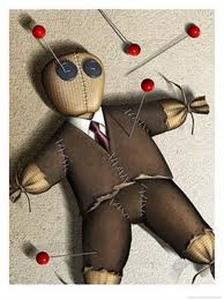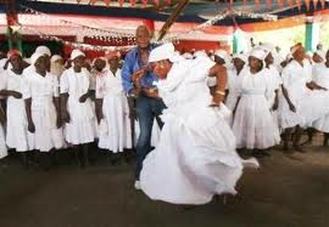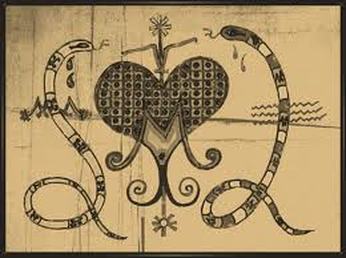
The infamous Voodoo doll
It drives me crazy when people refer to Santería as Voodoo. That's like calling a Southern Baptist a Lutheran. To someone outside those religions, they seem pretty much the same, right? Both Christian, Protestant... But, people who belong to those churches will tell you that they're "completely different," and they'll get upset with you if you argue that there's no difference between the various Protestant sects. Same goes for those of us who practice African-based religions. Our belief systems might share some basic common threads, but Santería and Voodoo are not the same thing.
First, there are a lot of misconceptions about African-based religions in general. If you go by what you see on television, you'd think practitioners of Voodoo and Santería are devil worshipers who practice black magic. They stick pins in voodoo dolls and cast evil spells that kill their enemies. They manipulate and corrupt innocent people who fall under their influence, they engage in wild orgies, and practice ritualistic torture and murder. We see images of naked (usually dark skinned) bodies, smeared with blood, dancing wildly around bonfires at midnight, all part of a mysterious ceremony that inevitably ends in violence, usually carried out on an altar heaped with candles, statues of saints, bowls, bottles, skulls, bones, dead chickens, and layers of dirt and grime. Everything about these images inspires fear. They represent a threat to us, our orderly way of life, our belief system. But, what you see on tv is not Voodoo. It's not Santería. It's the imagination of writers and producers who want to boost TV ratings by showing us gruesome and shocking images of others who aren't "like us." These strange, primitive foreigners are to blame when bad things happen to nice people. Most TV shows don't acknowledge Santería or Voodoo as religions - they always call them a cult - so who's going to say they're showing religious intolerance? They're just showing images that correspond to what a lot of people already think is true. Sure, the world is a frightening place sometimes, and crazy people do horrible things to innocent people. But, most of the time, the crimes have nothing to do with Voodoo or Santería. Remember Charles Manson, Ted Bundy, and John Wayne Gacy? How about Timothy McVeigh? Or Jim Jones and his poison kool-aid? To my knowledge, they weren't connected to Voodoo or Santería in any way. So, let's keep it real when we talk about dangerous people, ok?
First, there are a lot of misconceptions about African-based religions in general. If you go by what you see on television, you'd think practitioners of Voodoo and Santería are devil worshipers who practice black magic. They stick pins in voodoo dolls and cast evil spells that kill their enemies. They manipulate and corrupt innocent people who fall under their influence, they engage in wild orgies, and practice ritualistic torture and murder. We see images of naked (usually dark skinned) bodies, smeared with blood, dancing wildly around bonfires at midnight, all part of a mysterious ceremony that inevitably ends in violence, usually carried out on an altar heaped with candles, statues of saints, bowls, bottles, skulls, bones, dead chickens, and layers of dirt and grime. Everything about these images inspires fear. They represent a threat to us, our orderly way of life, our belief system. But, what you see on tv is not Voodoo. It's not Santería. It's the imagination of writers and producers who want to boost TV ratings by showing us gruesome and shocking images of others who aren't "like us." These strange, primitive foreigners are to blame when bad things happen to nice people. Most TV shows don't acknowledge Santería or Voodoo as religions - they always call them a cult - so who's going to say they're showing religious intolerance? They're just showing images that correspond to what a lot of people already think is true. Sure, the world is a frightening place sometimes, and crazy people do horrible things to innocent people. But, most of the time, the crimes have nothing to do with Voodoo or Santería. Remember Charles Manson, Ted Bundy, and John Wayne Gacy? How about Timothy McVeigh? Or Jim Jones and his poison kool-aid? To my knowledge, they weren't connected to Voodoo or Santería in any way. So, let's keep it real when we talk about dangerous people, ok?

A Voodoo ceremony in Haiti
What do we even mean when we talk about Voodoo? For example, there's West African Vodun, Haitian Vodou, and New Orleans style Voodoo that's practiced in the coastal regions of the southern USA. Each variety has its own unique history, character, and set of practices.
Haitian Vodou originated with the Fon and Ewe peoples in Dahomey, West Africa (today Benin, and parts of Togo and Ghana). Dahomey bordered the lands of the Yoruba people, many of whom would eventually go to Cuba as slaves and take their religion with them. A significant number of Dahomeans ended up as slaves in the French colony of Saint-Domingue (today Haiti). Others were taken to coastal South Carolina, notably the Gullah Islands, and to Louisiana, where the plantation system depended heavily on slave labor. These slaves took African Vodun to the New World, where it became established in Haiti and the coastal regions of the Southern USA roughly around the same time that Santería was taking hold in Cuba among the Lucumí people. During the Haitian Revolution (1791-1804), many French families fled Saint Domingue with their slaves and settled in New Orleans, and the number of Voodoo practitioners there increased dramatically. Over the course of the past two centuries, Haitian Vodou and New Orleans Voodoo have gradually taken on different characters, despite shared African roots, and today neither is identical to the religion as it's practiced in modern Africa.
Haitian Vodou originated with the Fon and Ewe peoples in Dahomey, West Africa (today Benin, and parts of Togo and Ghana). Dahomey bordered the lands of the Yoruba people, many of whom would eventually go to Cuba as slaves and take their religion with them. A significant number of Dahomeans ended up as slaves in the French colony of Saint-Domingue (today Haiti). Others were taken to coastal South Carolina, notably the Gullah Islands, and to Louisiana, where the plantation system depended heavily on slave labor. These slaves took African Vodun to the New World, where it became established in Haiti and the coastal regions of the Southern USA roughly around the same time that Santería was taking hold in Cuba among the Lucumí people. During the Haitian Revolution (1791-1804), many French families fled Saint Domingue with their slaves and settled in New Orleans, and the number of Voodoo practitioners there increased dramatically. Over the course of the past two centuries, Haitian Vodou and New Orleans Voodoo have gradually taken on different characters, despite shared African roots, and today neither is identical to the religion as it's practiced in modern Africa.

A Voodoo talisman for protection
I don't know enough about Voodoo to speak about it with authority, and I won't attempt to explain it here because it's outside my area of expertise. But, this much is clear: just because Santería and Voodoo have similar histories, it doesn't mean they're the same thing. Yes, they have roots in West Africa, and they came to the New World on slave ships. Yes, they grew up in places where Africans were marginalized and abused as slaves, and they offered practitioners a glimmer of hope and strategies for survival in a brutal world. Beyond that, each religion took its own path and developed in its own way, becoming a reflection of the people who practiced it in a particular place at a particular time. The next time you hear someone say that Santería and Voodoo are the same thing, you can confidently tell them they're mistaken.
If you want to know more about Voodoo as a religion, I recommend these books by Kenaz Filan: The Haitian Vodou Handbook (Rochester, Vt.: Destiny Books, 2007) and The New Orleans Voodoo Handbook (Rochester, Vt.: Destiny Books, 2011). They're sensible, informative and well written.
If you want to know more about Voodoo as a religion, I recommend these books by Kenaz Filan: The Haitian Vodou Handbook (Rochester, Vt.: Destiny Books, 2007) and The New Orleans Voodoo Handbook (Rochester, Vt.: Destiny Books, 2011). They're sensible, informative and well written.
 RSS Feed
RSS Feed
